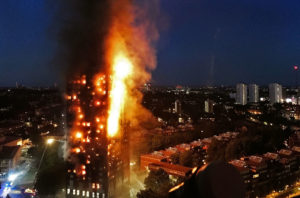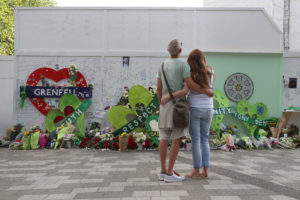Five years ago, in the early hours of the morning, I was suddenly awoken by a ringing mobile phone. Sky News were hoping to speak to a Fire Brigades Union (FBU) official. A fire was ripping through a high-rise residential block in west London, and several were feared dead.
I switched on the TV and stood horrified at the images of Grenfell Tower ablaze from top to bottom. I had fought fires in high-rise buildings, but never before, in my then 20-year career as a London firefighter, had I witnessed such a spectacle.
Over the ensuing hours and days, I helped co-ordinate the FBU’s response to the tragedy. I heard first-hand accounts from firefighters — some of whom were personal friends and colleagues — who had attended the incident. Despite having shown bravery beyond measure, their testimonies were relayed without drama or self-regard. They had entered the tower uncertain that it wouldn’t collapse around them. Some had hastily scrawled their names on their protective helmets to make sure they could be easily identified in the event they didn’t make it out alive.
Standard operating procedures went out of the window as firefighters did their best to improvise in a situation none had previously encountered. Amid the ferocious heat and thick, acrid smoke, some had removed their breathing apparatus facemasks and planted them over the faces of casualties. Incredibly, a number of firefighters entered the burning tower several times. One crew had even tried to fight its way up the entire length of the building in a bid to reach the roof and drench the flames from above. Others, having taken themselves to their physical and mental limits, collapsed as they exited the tower. The effects of exhaustion caused some to vomit.
Back at the 999 call-handling centre in Stratford, east London, operators were taking a stream of harrowing calls — the details of which will remain with them for ever — from trapped residents. I spoke later to a manager at the centre, Peter May, the most unassuming of men. During those desperate hours, he was almost single-handedly responsible for organising the deployment of hundreds of firefighters and scores of engines, striving to ensure that, as more and more resources were directed to the tower, the rest of the capital was not left without fire cover. Peter’s testimony is a matter of public record. People like him are quiet heroes.
As the smoke cleared, literally and figuratively, we in the FBU tried to make sense of this most appalling of tragedies. Questions raged. How in an advanced Western city could more than 70 residents settle down for the night in an apparently safe block of flats, yet perish before sun came up? How in a society so obsessed with health and safety and red tape was it possible for potentially lethal cladding to be fixed not only to Grenfell Tower but, as we came to discover, hundreds of other high-rise buildings across the country? How was this any different to dousing these buildings in petrol and just hoping that no-one would ever put a match to them?
And it wasn’t like nobody had flagged up the dangers. While the scenes at Grenfell Tower were certainly unprecedented, they were not unforeseen. The FBU foresaw them: in 1999, the union had, with horrible prescience, warned select committee MPs in a written submission about the threat of combustible external cladding on high-rise buildings. One passage from the submission sends a shiver up the spine:
“The primary risk therefore of a cladding system is that of providing a vehicle for assisting uncontrolled fire spread up the outer face of the building, with the strong possibility of the fire re-entering the building at higher levels via windows or other unprotected areas in the face of the building. This in turn poses a threat to the life safety of the residents above the fire floor.”
That was precisely the scenario that played out at Grenfell Tower. Policymakers have a habit of ignoring the warnings of trade unions or dismissing them for “scaremongering”. This time, their disregard proved catastrophic.
The union had also campaigned against a deregulation agenda, set in train by the Thatcher government in the Eighties and continued under New Labour, that had diluted fire safety standards and allowed private, uncertified inspectors to sign-off building plans. These were the type of legislative changes that command little attention from the public and media, and often sail through parliament without proper scrutiny or debate. Only when someone dies are the merits of such changes deemed worthy of closer examination.
The public inquiry into the Grenfell disaster was announced by the Theresa May government, but the ordering was back to front. The first phase would examine the events on the evening of the fire, including the actions of firefighters. Inevitably, these early proceedings would take place amid a blaze of publicity. Only much later would the individuals who deserved to face the toughest questions take the witness stand — those who were responsible for the fact that highly-combustible materials were able to enter the market and be affixed to residential buildings without hindrance. By which time, as events subsequently proved, the media bandwagon would have rolled on.
Millions will have seen news footage of firefighters on the witness stand, quietly yet conscientiously retelling their stories while facing a barrage of forensic questions from inquiry lawyers seeking to pick apart their every action and decision. Which was a perfectly legitimate exercise, of course.
But how many media organisations or members of the public were still interested 18 months and more later, when the inquiry heard that one of the firms that manufactured the combustible insulation installed at the tower had mis-sold it, as though selling “horsemeat as beef”? Or that the company which made the tower’s cladding sheets obtained a certificate on a “false premise” by misleadingly submitting reports for a safer version of the product? Or that contractors involved in the tower’s renovation had used inferior products in an effort to reduce costs? Or that the local authority had made significant austerity-driven cuts in its building control department, meaning the surveyor responsible for ensuring the renovation of the tower was compliant with building regulations was swamped with work? Or that the director of another firm which manufactured some of the insulation had said that consultants who raised concerns about the safety of the product could “go fuck themselves”? Or that government officials had been “dismissive” of a coroner’s recommendations following the deaths of six people in a fire at another London residential high-rise block, Lakanal House, in 2009? Or when, in a shameful appearance on the witness stand, former minister Eric Pickles got the death toll wrong before going on to tell the inquiry lawyer to get a move on because he had other commitments that afternoon?
To add insult to injury, corporate witnesses demanded and secured immunity from prosecution over anything they said to the inquiry, threatening to withhold their testimonies if they didn’t receive it. It was a move that told us everything about their motivations and priorities.
The inquiry’s Phase I report praised firefighters for their “courage and devotion to duty” but levelled sharp criticisms at the fire service more widely. By that time, I had parted ways with the union and was back working for the London Fire Brigade at its headquarters. The criticisms stung. The then-commissioner, Dany Cotton, was forced to resign. Everyone in the service knew that, on that awful night, our colleagues were motivated by nothing other than a desperate desire to protect and save those in peril. It was clear to us that the same sense of obligation to their fellow citizens couldn’t exactly be attributed to those miscreants whose corner-cutting was the ultimate cause of the tragedy.
The inquiry rumbles on. Meanwhile, a poor, disadvantaged community in west London refuses to be forgotten. Campaigners hold regular silent street marches to remember those whose lives were lost and to let it be known they still want justice. Whether or not they will receive it remains an open question.
Disclaimer
Some of the posts we share are controversial and we do not necessarily agree with them in the whole extend. Sometimes we agree with the content or part of it but we do not agree with the narration or language. Nevertheless we find them somehow interesting, valuable and/or informative or we share them, because we strongly believe in freedom of speech, free press and journalism. We strongly encourage you to have a critical approach to all the content, do your own research and analysis to build your own opinion.
We would be glad to have your feedback.
Source: UnHerd Read the original article here: https://unherd.com



